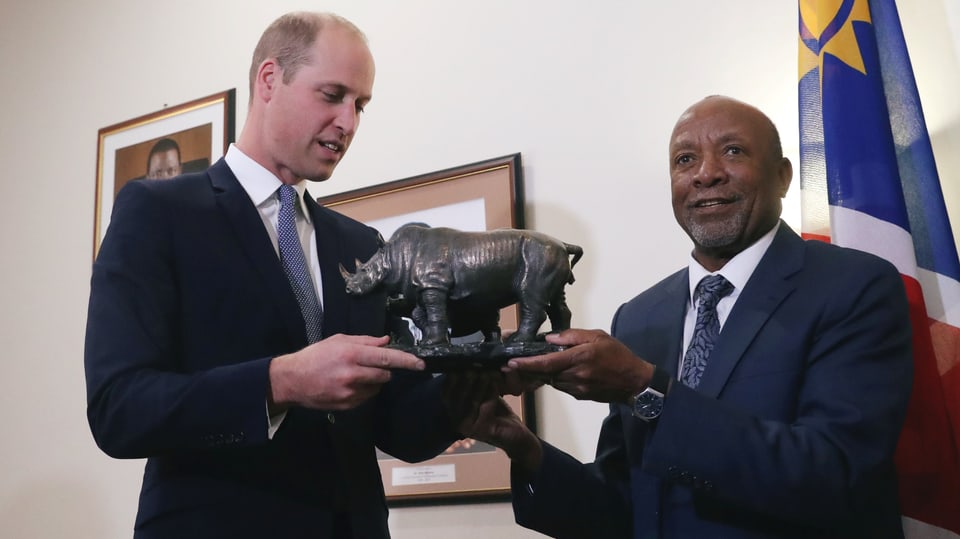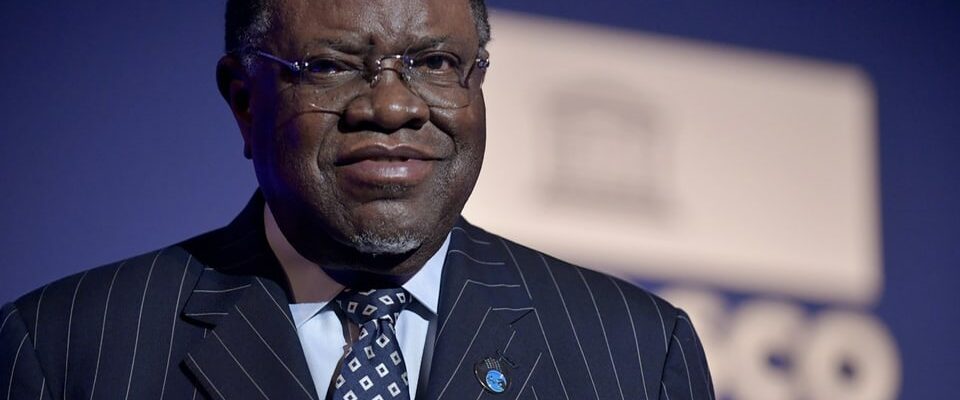- The incumbent president, Hage Geingob, died at the age of 82 in Namibia, southwest Africa.
- Geingob was the third president of Namibia and the first prime minister after the country gained independence in the 1990s.
- Now he died in a hospital in the capital Windhoek after suffering from cancer.
The statesman, who once fought for social justice but failed to keep his promises for economic development, died early Sunday morning at the age of 82 in a hospital in Windhoek, as incumbent President Nangolo Mbumba announced on the X platform, formerly Twitter. Geingob’s wife Monica and his children were at his side.
Legend:
Namibia’s President Hage Geingob in a photo from 2021.
Archive/Keystone/Juilen de Rosa/Pool Photo via AP
Born on August 3, 1941 in the rural town of Otjiwarongo in what was then South West Africa, Geingob initially began training as a teacher. In the 1960s, he joined the liberation movement to free his country from foreign administration by neighboring South Africa, which was then run by the racist apartheid government. Geingob became a member of the South West African People’s Organization (SWAPO), which later violently pursued its goal of independence with military support from the Soviet Union and Cuba.
Director of the UN Institute for Namibia
Geingob initially acted as SWAPO’s deputy in Botswana and was appointed SWAPO representative to the United Nations in New York in 1964, where he simultaneously studied political science at renowned US universities.

Legend:
The current Vice President Nangolo Mbumba will take over the office of head of state until the parliamentary and presidential elections in November – here in the picture with Great Britain’s Prince William in 2018.
Archive/REUTERS/Mike Hutchings
When the UN Institute for Namibia was founded in 1975, Geingob became its director, a position he held until his return to his Namibian homeland in 1989. Geingob was one of the leading figures in his party and played a crucial role until Namibia’s independence in 1990. Among other things, he was one of the main authors of the country’s new constitution.
Commitment to reconciliation and reconstruction
As the first prime minister of independent Namibia – under the presidency of Sam Nujoma – Geingob campaigned for the reconciliation and reconstruction of the former German colony (1884 – 1915) with 2.6 million inhabitants. After a stint as industry and trade minister, Geingob became prime minister for the second time in 2012. In November 2014, Namibians elected him president by a large majority and confirmed him for a second term five years later.
Geingob was considered a brilliant thinker and accomplished rhetorician who fought for the rights of the oppressed. His vision of a united and economically strong Namibia made him a respected head of state, both within the country and at the international level, especially during his first term in office. One of Geingob’s most important political achievements is the establishment of a public service in Namibia. Conservation and eco-tourism were also high on Geingob’s political agenda.
Dwindling trust and serious allegations of corruption
However, during his second term, for which he narrowly received a majority of votes, Geingob lost public reputation. One of the reasons for the sharp decline in trust was his inability to put a stop to mismanagement and unemployment. His lavish lifestyle, his inability to accept criticism and his increasing political cooperation with China also caused discontent among the population.
In 2021, Geingob faced serious corruption allegations of his own: He was accused of embezzling millions of dollars by allegedly instructing government officials to divert funds from a state-owned fishing company for political bribes. However, the results of the investigation are still pending today.
